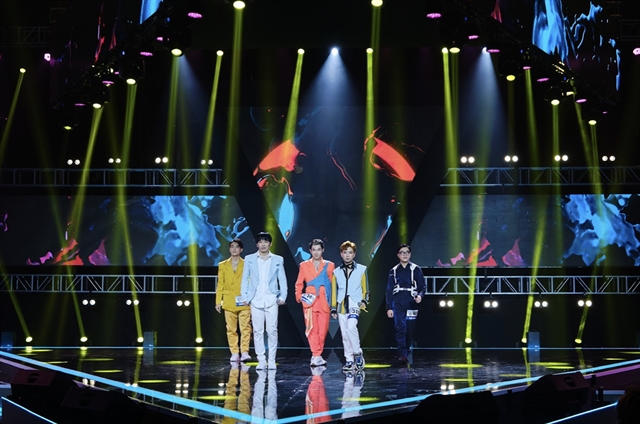 Sunday/Weekend
Sunday/Weekend

 |
| Vietnamese audiences are showing a preference for indie bands like Cá Hồi Hoang, Chillies and Ngọt over the borrowed concept of idol bands. Photo of Chililes' MV |
By Xuân Đăng
HCM CITY — Vietnamese music has become more diverse and prolific in recent years, but bands and artistes that strike a chord with listeners are those who do their own thing.
The golden period for Vietnamese bands seems to have started in late nineties and go on for a couple of decades. Many people still remember popular bands of that time, including 1088, AXN, The Men, Mây Trắng, Mắt Ngọc, or Năm Dòng Kẻ.
These days, however, it seems more difficult for entertainment agencies to maintain and sustain a band.
As soon as they made their debut, several Vpop boygroups or girlgroups have faced criticism from netizens.
One factor is that the resounding success and popularity of South Korean bands prompt many music companies in Việt Nam to strive to follow the same music band concept.
However, the efforts to emulate Kpop groups don’t seem to work with Vietnamese fans.
For example, last year a seven-member boy band named FOR7 made its debut.
The management company had prepared marketing plans before the band's official debut, but they received negative comments from the audience who pointed out that the concept was copied from the famous South Korean band — GOT7.
SGO48, a Vietnamese version of the popular Japanese girl band AKB48 with 28 members, broke up last year, three years after its debut.
SGO48 had 28 members trained in vocals, dance and performance skills by music producers, composers and singers invited by YAG Entertainment in co-operation with its partner Yeah1 Group. Yet, the band failed to win the audience’s hearts.
Đoàn Dung, 22, tells Việt Nam News that she comes to know when a new band debuts, but doesn't follow them because she feels that their music products do not make the cut, compared to the Korean counterparts they try to emulate.
“It’s hard to not make comparison here. As a fan of Kpop I feel that the music products of Korean groups have more character and quality," she says.
“Recently, I heard about the new game show -- "Vote for Five", which is a gameshow similar to South Korean game shows that seek to discover young talents to form a new group. I watched a few performances on this show, but I wasn't impressed."
 |
| The new game show 'Vote for Five' received mixed reviews from the audience because the quality of the show was not really impressive. Photo courtesy of WEPRO |
Unique characteristics
Unlike the concept of idol groups, indie groups are better received by the Vietnamese audience.
Indie music bands like Cá Hồi Hoang (Wild Salmon), Chillies and Ngọt and Da Lab are making their mark because they have their own character or personality and don’t fall into any stereotype.
Most indie artists control all stages of the music production, from composing, mixing and producing to releasing and promoting their products.
Indie music, which is produced independently of record labels and their marketing strategies, has not only brought new sounds to the Vietnamese contemporary music scene for several years, but also gained international attention.
Last month, Chillies, one of the popular indie bands at the moment, released a new MV named Vì Sao ( Why), and received great feedback from the fans.
Their first album, Qua Khung Cửa Sổ (Through the Window) with 10 songs about 10 different stories, was released last year. It sold 1,000 physical copies by pre-order, an impressive number for such young artists in Việt Nam.
Chillies show off their versatility by not confining themselves to a particular genre of music. They play everything from alternative rock such as Vùng Kí Ức (Memory Zone), Đừng Khóc (Don't Cry) and Đường Chân Trời (Horizon) to pop songs like Bao Nhiêu (How Much), Qua Khung Cửa Sổ (Through the Window) and Mascara.
Another indie group that has also received a lot of attention from the audience is Cá Hồi Hoang. Metaphorical and figurative lyrics are striking features of this four-member band
In an age of uncertainty, Vietnamese youth find the band’s songs relevant. Thành Luke’s unusual voice, Minh’s guitar and Đạt’s bass seem to succeed in generating hope and strong belief in humanity.
The message is clear for present and future bands: Vietnamese audiences still pay more attention to the quality of music products than flashy images.
Management companies would do well, therefore, to pay attention to identity, uniqueness and quality of music products when they promote a band. Doing this will increase their chances of success and sustainability in the Vietnamese music market. VNS




